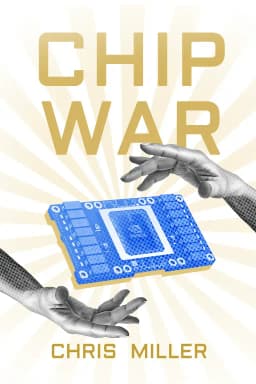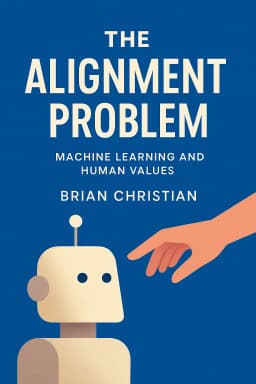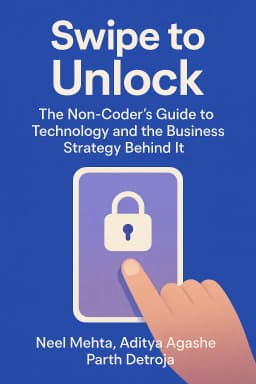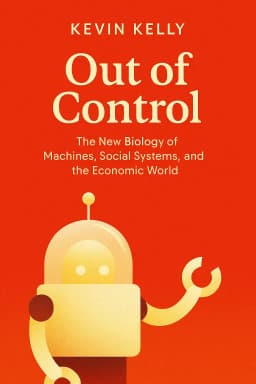
The Great Digital Heist
How Facebook, Google, and Amazon Cornered Culture and Undermined Democracy
Golden Hook & Introduction
SECTION
Joe: In the last 20 years, the music industry's revenue has been sliced by more than half, from nearly $20 billion down to around $7 billion. But here's the thing—we're all listening to more music than ever before. Lewis: Whoa, that doesn't add up. Where did all that money go? It's like the entire ocean of cash just evaporated. Joe: It didn't evaporate. It was rerouted. And the story of where it went is basically the story of a grand digital heist. That's the core argument in a blistering book we're diving into today: Move Fast and Break Things: How Facebook, Google, and Amazon Cornered Culture and Undermined Democracy by Jonathan Taplin. Lewis: Move fast and break things... I feel like that was a Silicon Valley motto for a long time. It was on posters, right? Joe: It was Facebook's internal motto for years. And Taplin is the perfect person to tell this story. He wasn't just an academic watching from the sidelines; he was in the trenches of culture. This is a guy who was the tour manager for Bob Dylan and The Band, and he went on to produce Martin Scorsese's legendary film Mean Streets. He saw the old system, with all its flaws, firsthand, which makes his critique of the new one so incredibly powerful and personal. Lewis: Okay, so he's got the street cred. A tour manager for The Band turned tech critic. That's a wild career path. So where does he start this story of a digital heist? How did it even begin?
The Hijacking of the Internet's Utopian Dream
SECTION
Joe: Well, to understand the heist, you have to understand what was being stolen. And Taplin argues it was the very soul of the internet. He takes us back to its origins, and it's not what you'd think. It wasn't born in a corporate boardroom. It was, for all intents and purposes, a hippie dream. Lewis: Wait, the internet was started by hippies? That sounds... unlikely. I always pictured a bunch of government guys in a bunker during the Cold War. Joe: That's part of it, the military funding from DARPA. But the spirit, the ethos, came from the counterculture. Taplin points to figures like Stewart Brand, the creator of The Whole Earth Catalog—a kind of analog Google for communes in the 60s. The guiding principle was "access to tools." The idea was to empower the individual, to decentralize power, to connect people in a non-hierarchical way. Lewis: Okay, I'm trying to picture this. Flower power and fiber optics. Joe: Exactly. And the peak of this idealism was a moment in 1968 that Taplin describes beautifully, called the "Mother of All Demos." A researcher named Doug Engelbart gets on stage and, for 90 minutes, demonstrates a system that has, for the first time ever, a computer mouse, hypertext, windows, and video conferencing. Lewis: Hold on. The mouse, windows... all of that was invented in 1968? By this one idealist? Joe: Yes. And his goal wasn't to build a better machine; it was to augment human intellect. He wanted to use technology to help people solve the world's complex problems together. It was a profoundly humanistic vision. That was the original promise of the internet: a tool for liberation and collaboration. Lewis: That's incredible. So if it started there, with this beautiful, utopian vision... how on earth did we end up with... well, this? A world of doom-scrolling, data harvesting, and fake news? Joe: That, Lewis, is the coup. Taplin argues this utopian dream was hijacked by a completely different ideology: a radical, hard-edged libertarianism. And he puts a face to this movement: Peter Thiel. Lewis: The PayPal guy, early Facebook investor. He’s a big name. Joe: A huge name. And his philosophy was the polar opposite of Engelbart's. Thiel, a disciple of Ayn Rand, famously taught a class at Stanford where he argued that the goal of any smart business isn't to compete, but to build a monopoly. His motto could be summed up as "competition is for losers." Lewis: Okay, but isn't that just smart, ruthless capitalism? Find a market, dominate it, and win. Why is that a 'hijacking'? Joe: Because it came with a political agenda that was fundamentally anti-democratic. Thiel has been quoted saying, "I no longer believe that freedom and democracy are compatible." The goal of the PayPal Mafia, as they were called, wasn't just to build a business. It was to create a new world order, one free from government regulation, taxes, and any sense of collective social responsibility. Lewis: That sounds a bit extreme. Escape the government, escape taxes... Joe: It is. Think about it. The original vision was about empowering communities. The new vision was about empowering the individual entrepreneur to become a king, unaccountable to anyone. They saw the internet not as a public square, but as a new frontier to be conquered and owned. And in their world, information didn't just want to be free; it had to be free, because "free" was the battering ram they used to break down the old structures of culture. And that's where the real destruction began.
The Great Wealth Transfer & The Story of Levon Helm
SECTION
Lewis: Okay, so you have this ideological shift from hippie commune to libertarian kingdom. But how did that actually 'break things' for regular people, for artists? Joe: It broke their ability to make a living. And Taplin makes this devastatingly clear with the story of Levon Helm. Lewis: The drummer and singer for The Band. An absolute legend. "The Weight," "The Night They Drove Old Dixie Down"... his voice is iconic. Joe: Truly. And Taplin knew him personally from his tour manager days. He tells us that in the old system, the music business was flawed, but it worked. If you were in a successful band like The Band, even if you weren't the main songwriter, you made a good living from record sales. The money was spread out. But then came the digital disruption. Lewis: Napster. I remember that. Free music for everyone. It felt like magic. Joe: It felt like magic to the user, but it was a bomb going off in the creative economy. And Sean Parker, the founder of Napster and later the first president of Facebook, embodied this new ethos. His attitude was, "Don't ask for permission, just do it." They knew it was copyright infringement, but they didn't care. Growth was the only thing that mattered. Lewis: And that set the stage for everything that followed. Joe: Precisely. After Napster, the genie was out of the bottle. The expectation was set: music should be free, or close to it. And platforms like YouTube, and later Spotify, built their empires on this principle. Which brings us back to Levon Helm. In the final years of his life, he was diagnosed with throat cancer. He had massive medical bills. And despite being a rock and roll hall of famer, he was struggling financially. He had to keep touring, even while sick, just to pay his bills. Lewis: That's heartbreaking. He was a legend. How can that be possible when his music was probably being played millions of times a day online? Joe: That's the crux of it. It was being played millions of times. But the money wasn't flowing to him. Taplin lays out the brutal math. For three months of his song "The Weight" being streamed over 5 million times on Pandora, the songwriters—not even the performers—received a check for just $176. Lewis: One hundred and seventy-six dollars? For five million plays of a classic song? That's insane. It's not even a rounding error. Joe: It's nothing. And Taplin points the finger directly at the platforms. He cites data showing that YouTube, which controls over half of the entire music streaming market, pays out only about 13% of the total streaming revenues to the music industry. They built a multi-billion dollar business on the back of creative content, and they give back pennies. Lewis: So it's like they built this beautiful, massive public library that's open 24/7, but they told the authors they'd only get paid if someone happens to donate a nickel on their way out. Joe: That's a perfect analogy. And it happened across the board. To journalism, with Google and Facebook sucking up 85% of all new online advertising dollars, leaving news organizations to fight for scraps. To book publishing, with Amazon's predatory pricing and monopoly power. It was a systematic transfer of wealth from the creators of culture to the owners of the platforms. The people who made the things we love were left with the crumbs, while the tech monopolists became the richest people in human history.
The Digital Renaissance & A Path Forward
SECTION
Lewis: This all sounds incredibly bleak, Joe. It feels like the game is rigged and they've already won. Is there any way out of this, or are we just stuck living in their world? Joe: It does sound bleak, and Taplin doesn't pull any punches. But the last part of the book is actually a message of hope. He argues that this outcome was not inevitable, and he calls for a "Digital Renaissance" to reclaim the internet. Lewis: A Digital Renaissance. I like the sound of that. But what does it actually mean? How do you fight back against companies that are bigger than most countries? Joe: He proposes a few concrete, powerful ideas. And he starts with a story that feels like a real-life David versus Goliath. It's the story of Chattanooga, Tennessee. Lewis: Chattanooga? What happened there? Joe: In the early 2010s, Chattanooga was a struggling post-industrial city. But they had a municipally-owned utility, the Electric Power Board, or EPB. When Volkswagen wanted to build a high-tech factory there, they needed ultra-reliable power. So the EPB built a "smart grid" using fiber-optic cable. Once they'd strung fiber all over the city, they realized something. Lewis: They could sell internet service. Joe: Exactly. They could offer super-fast, one-gigabit-per-second internet directly to every home. The local monopoly, Comcast, went to war. They sued, they lobbied, they did everything they could to stop this public utility from competing with them. Lewis: And what happened? Joe: EPB won. They offered faster, cheaper, more reliable internet. The city transformed. A vibrant tech scene sprung up. People moved there just for the internet. It showed that when you introduce real competition, and when a community takes control of its own infrastructure, you can break a monopoly's stranglehold. Lewis: Wow, so a city just... built its own internet? And it worked? That's amazing. Joe: It's a powerful model. And Taplin uses it to springboard into his bigger proposals. First, he says we need to get serious about antitrust again. We need to challenge the "Bork rule" that says a monopoly is fine as long as consumer prices are low. Because the price of "free" search is our privacy, our democracy, and the livelihoods of creators. He suggests we could treat Google like we treated AT&T in the 80s—break it up or force it to license its core patents to encourage competition. Lewis: That would be a massive fight. Joe: A massive fight, but a necessary one. Second, he proposes new business models for creators, specifically cooperatives. He points to the history of Sunkist, the citrus growers' co-op. Individual farmers were getting crushed by middlemen, so they banded together, created a brand, and controlled their own distribution. Why can't musicians or journalists do the same? Create a platform they own collectively, where they set the prices and keep the majority of the revenue. Lewis: A Sunkist for Spotify. I like that. It gives the power back to the artists. Joe: It puts them back in control. And finally, he argues for a robust, well-funded public media system, like the BBC in the UK. An alternative to the ad-driven, clickbait-fueled world of surveillance marketing.
Synthesis & Takeaways
SECTION
Joe: So when you put it all together, you see this incredible arc. It starts with a utopian dream for a connected, democratic world. That dream gets hijacked by a ruthless libertarian ideology that values monopoly over community. This leads to the systematic draining of our cultural economy, leaving artists and journalists struggling to survive. Lewis: But it doesn't have to end there. The Chattanooga story shows that. These systems aren't laws of nature. They were built by people, and they can be rebuilt by people. Joe: Exactly. It really makes you rethink what the word 'free' actually costs. When I use a 'free' search or listen to 'free' music, who is really paying the price? It’s not me, not with money anyway. The price is paid by the journalist who got laid off, by the musician who can't afford their rent, and ultimately, by the health of our culture and our democracy. Lewis: That's the question, isn't it? It's not about abandoning technology or going back in time. It's about being conscious of the choices we're making, both as individuals and as a society. Joe: That's the heart of Taplin's call for a Digital Renaissance. It's a call to be active citizens of the internet, not just passive consumers. To demand better, to support creators directly, and to choose to build a digital world that reflects our values. Lewis: It's a powerful message. And it makes me want to be more deliberate. We'd love to hear what our listeners think. What's one creative work—an album, a subscription to a local paper, a Patreon for a writer—that you'd be willing to pay for directly to support the artist? Let us know. It’s a small act, but it’s a start. Joe: A great place to start. This is Aibrary, signing off.









